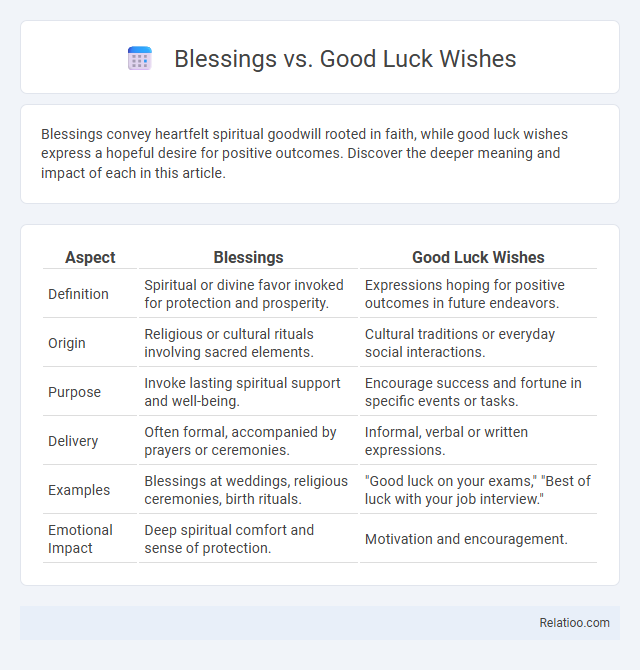Blessings convey heartfelt spiritual goodwill rooted in faith, while good luck wishes express a hopeful desire for positive outcomes. Discover the deeper meaning and impact of each in this article.
Table of Comparison
| Aspect | Blessings | Good Luck Wishes |
|---|---|---|
| Definition | Spiritual or divine favor invoked for protection and prosperity. | Expressions hoping for positive outcomes in future endeavors. |
| Origin | Religious or cultural rituals involving sacred elements. | Cultural traditions or everyday social interactions. |
| Purpose | Invoke lasting spiritual support and well-being. | Encourage success and fortune in specific events or tasks. |
| Delivery | Often formal, accompanied by prayers or ceremonies. | Informal, verbal or written expressions. |
| Examples | Blessings at weddings, religious ceremonies, birth rituals. | "Good luck on your exams," "Best of luck with your job interview." |
| Emotional Impact | Deep spiritual comfort and sense of protection. | Motivation and encouragement. |
Understanding Blessings and Good Luck Wishes
Blessings often imply a spiritual or heartfelt endorsement for someone's well-being, rooted in cultural or religious traditions, whereas good luck wishes are expressions of hope for positive outcomes in specific situations. Blessings carry a deeper emotional and sometimes sacred significance beyond mere chance, while good luck wishes emphasize optimism and encouragement for success. Understanding these differences helps tailor meaningful messages that resonate personally or contextually in social interactions.
Historical Roots of Blessings
Blessings stem from ancient spiritual traditions where they were seen as divine endorsements imparted through rituals and prayers, often linked to gods, ancestors, or sacred forces. Good luck wishes, in contrast, originate from more secular customs aimed at encouraging fortune in various endeavors without invoking the divine, reflecting cultural superstitions and communal hopes. Your understanding of these terms deepens by recognizing that blessings carry a profound historical weight tied to sacred authority, whereas good luck wishes and simple wishes are more casual expressions of goodwill or aspiration.
The Origins of Good Luck Wishes
Good luck wishes trace their origins to ancient cultures where rituals and symbols were believed to influence fate and fortune. The concept stems from early human attempts to control uncertainty by expressing hopes for positive outcomes in endeavors or life events. Your understanding of these wishes deepens as you recognize their roots in historical practices aimed at invoking protection and favorable circumstances.
Cultural Differences in Expression
Blessings often carry a spiritual or religious significance in many cultures, conveying deep-rooted hopes for divine protection and favor that go beyond mere chance. Good luck wishes typically emphasize positive outcomes through fortune or serendipity, commonly expressed in casual or secular contexts, especially in Western societies. Your understanding of these terms can be enhanced by recognizing that "wish" serves as a broad, versatile expression of hope or desire, adaptable across cultures but shaped by local customs and values.
Spiritual vs Secular Perspectives
Blessings often carry a spiritual connotation, invoking divine favor or protection from a higher power, whereas good luck wishes typically stem from secular traditions hoping for positive outcomes through chance or fortune. Spiritual blessings may involve rituals, prayers, or sacred symbols, reflecting faith and spiritual connection, while secular good luck wishes rely on cultural symbols like four-leaf clovers or horseshoes without religious significance. Your choice between blessings and good luck wishes depends on the desired expression of faith or secular hope in a given situation.
Impact on Recipients: Blessings vs Good Luck
Blessings often carry a deeper emotional and spiritual impact on recipients, conveying heartfelt goodwill and invoking positive energy or divine favor. Good luck wishes, while encouraging, tend to focus on external outcomes and the chance of success rather than a profound personal connection. Recipients of blessings frequently feel a lasting sense of comfort and support, making blessings more meaningful in emotionally significant moments compared to general good luck wishes.
When to Use Blessings or Good Luck Wishes
Blessings are typically used in religious or spiritual contexts to invoke divine favor and protection, often during significant life events like weddings, births, or graduations. Good luck wishes are more casual and secular, appropriate for situations requiring encouragement or success, such as exams, competitions, or job interviews. Use blessings when expressing heartfelt, sacred goodwill, and good luck wishes when offering support for everyday challenges or endeavors.
Common Phrases and Examples
Blessings often convey a spiritual or heartfelt desire for well-being, commonly expressed in phrases like "May you be blessed" or "Blessings to you and your family." Good luck wishes focus on fortune and success with popular expressions such as "Good luck on your exam" or "Wishing you all the best of luck." General wishes are more versatile and include phrases like "I wish you happiness" or "Wishing you a wonderful day," used in various contexts from birthdays to everyday encouragement.
Psychological Effects and Social Meaning
Blessings often carry a deeper psychological impact by invoking a sense of spiritual protection and emotional comfort, reinforcing social bonds through shared faith or values. Good luck wishes tend to focus on external outcomes, fostering optimism and motivation by suggesting favorable chance or fortune in uncertain situations. Your choice between these expressions can shape expectations and social connections, as blessings may create a stronger sense of communal support while good luck wishes emphasize hope for success.
Modern Usage in Everyday Life
Blessings often carry a spiritual or heartfelt connotation, conveying a deep sense of goodwill and protection, while good luck wishes are casual expressions hoping for favorable outcomes in specific situations. Wish is a more general term used broadly to express desires or hopes for any circumstance, making it versatile in everyday conversation. You can enhance your communication by choosing blessings for meaningful occasions, good luck wishes for challenges or efforts, and simple wishes for casual, everyday sentiments.

Infographic: Blessings vs Good Luck Wishes
 relatioo.com
relatioo.com